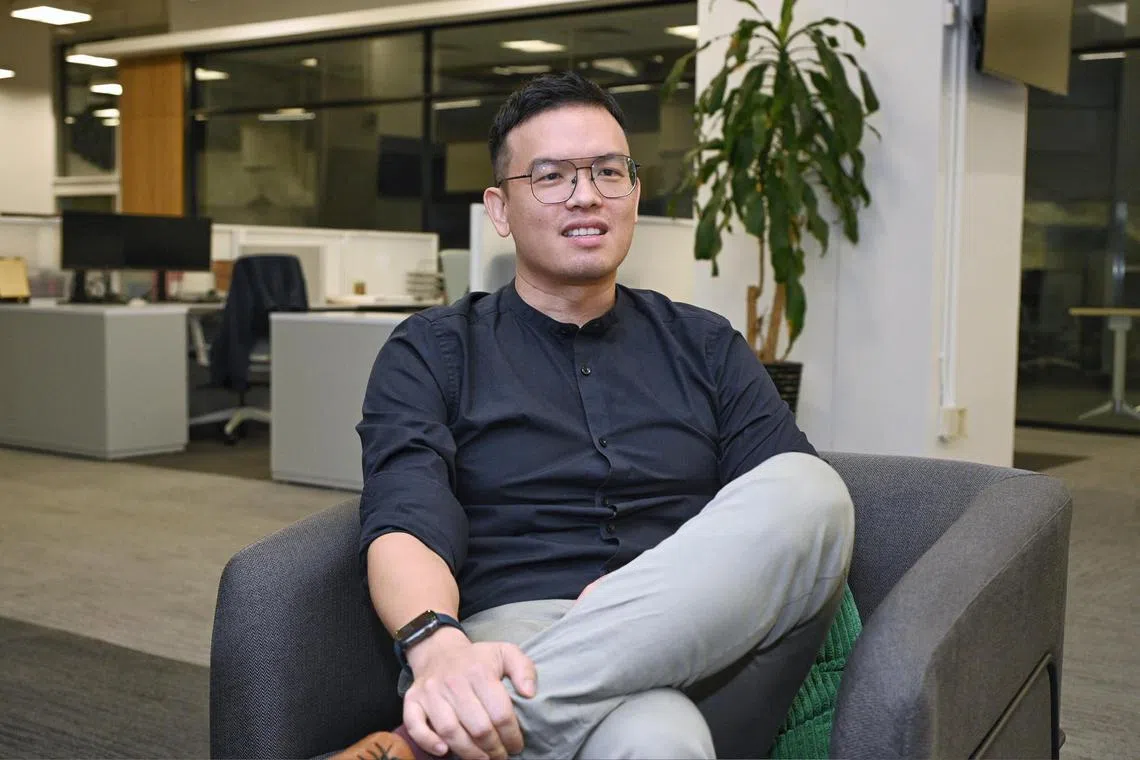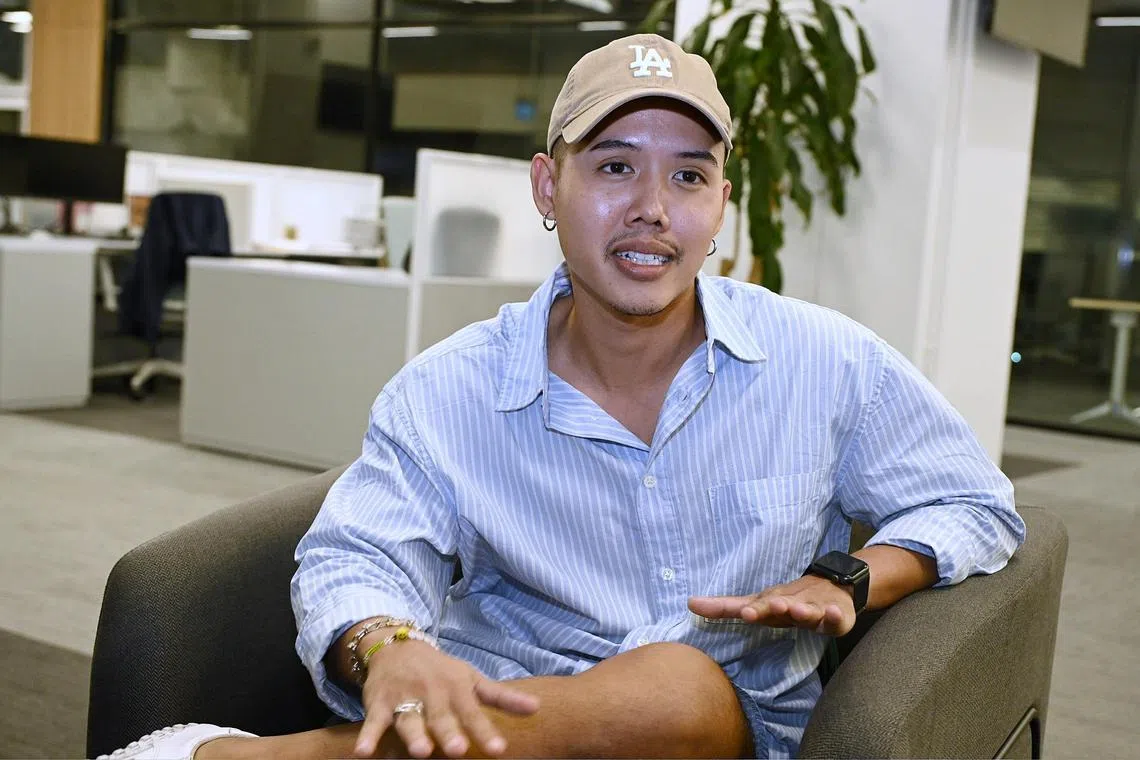The Usual Place
The FOMO over old buildings before they go
Sign up now: Get ST's newsletters delivered to your inbox
Is our celebration of old buildings, or even old-school businesses, a little too late?
Follow topic:
SINGAPORE – Something strange went down in the corridors and shops in Peace Centre in the months before it closed for good at the end of January.
There were more young people than usual, and they weren’t there to photocopy documents or go for tuition at the pioneer mall circa 1974, which long had an aura of grime.
Instead, they were there to hang out at thrift shops, vintage bookshops and art establishments, or to graffiti its walls.
I will admit it. I rolled my eyes. Another old building getting a last hurrah.
Recall the ageing dame, Golden Mile Complex, shuttered for redevelopment after almost standing for half a century.
In the final few years before the final tenants vacated by May 2023, the Brutalist architectural icon in Beach Road found new fans who went there for cocktails in a hidden bar, to make films about ‘her’, or to attend a “last mile” farewell party till the early morning.
Was the love a lil’ too late? And was it all just for the ’gram?
As a design and lifestyle reporter at The Straits Times during an earlier stint, I had perhaps hoped that such old spaces and businesses would have their moment a lot earlier.
In the latest episode of The Usual Place, I discussed this with my three guests, who each have their own ways of connecting with Singapore history and its old buildings.
Dhevarajan Devadas, 33, is a public policy analyst who produces content about Singapore’s history and heritage through a newsletter, podcast and on social media. Check out this history buff’s insights on @historyogisg
Meanwhile, Khair Mas’od, 26, who runs video production company Subset, did his final-year university project on Golden Mile Complex in 2023. He documented Singapore’s unofficial “Little Thailand” on @thiswasgmc
The last guest on my couch was John Siow, 38, who previously worked at the Urban Redevelopment Authority’s (URA) conservation department, managing outreach and education efforts. He and an ex-colleague teamed up to snap photos for @pintupagar.sg
John, now a senior manager in another field, said: “When the building is closing down, it presents an opportunity for a relaxation of the rules like leasing and tenancy issues.”
And that’s when people get creative.

John Siow, who used to manage outreach and education efforts at URA, said that the relaxation of leasing and tenancy rules towards the end of a building’s life can help draw a new crowd.
ST PHOTO: DESMOND WEE
Highlighting how social movement PlayPan took over Peace Centre in its last few months ,
Dhev said that it wasn’t just a thing young people these days do – the “desire to catch a final glimpse of history before it fades off” applies across generations.
“We’re just seeing it now on social media more prominently. I wouldn’t say it’s a very new thing, but it’s just taken on a slightly different form as it evolves with each generation,” he added, pointing out that we saw the same phenomenon 14 years ago, when the former Tanjong Pagar Railway Station was about to cease operations.
Khair said that he never had strong memories of Golden Mile Complex. He picked it as a subject because “(he) needed something to do for (his) final-year project”.
But after spending months documenting the life in it, he grew sentimental – in particular about the people who lived and worked there – as the clock ticked down to the complex’s closure.
“There was a real community here, and everyone was going to go. There was this warm, fuzzy feeling of human connection. I don’t know them and I don’t speak their language, but they (were hospitable) to me.”
He documented Golden Mile Complex till its last day, and long after he submitted his project.

For his final-year university project, Khair Mas’od chose to document life at Golden Mile Complex. While he had no prior experiences there, he soon formed connections with the people who lived and worked there.
ST PHOTO: DESMOND WEE
“I felt like if I just did it for my project and then stopped coverage, it would be such a waste. I (also) think I owe it to the people who gave me access into their lives to see it through with them,” he said. By then, the building’s residents were familiar and friendly with him.
While demolition is on the cards for Peace Centre, Golden Mile Complex is gazetted for conservation by URA. That means, we’ll see a new iteration of it.
I wondered if people here would show it the same enthusiasm then as they did in its last days.
Dhev said: “People will be willing to return because there is the memory of what it used to be and there’s also the ability to experience it in its new form.”

Public policy analyst and Singapore history buff Dhevarajan Devadas said that when an old building gets a new iteration, it’s all about getting the curation right to draw in people again.
ST PHOTO: DESMOND WEE
“But the curation has to be done carefully, because if it’s too drastically different or it affects the integrity of the space, then it may turn off people instead, as they (may) view the space as having been damaged in some way, and then they may not engage again,” he added.
For John, that’s where the people reimagining these old spaces – architects, designers and building managers, for example – have to keep their eye on “recognising the spirit of the place”.
I asked my guests what could be done to keep young people interested in Singapore’s built history and heritage before some of them go.
It wasn’t quite the answer I was hoping for, but my guests agreed that sometimes an Instagrammable spot and slick marketing do help.
Taking a less technical lens on our history and heritage is the way to go, said Dhev.
“We need to stop thinking of history and heritage as just a collection of places, names and dates to remember, because history tells stories, memories,” he said.
“If we look at it in that way, it’s more relatable to the average person. (History is not) something that only great people get to shape because the everyday ordinary lived experiences of Singaporeans through the generations is also history.”
Which old building would you be sad to see go? Write to me at natashaz@sph.com Instagram
I’ll see you next time at The Usual Place,
Nat
Host: Natasha Ann Zachariah ( natashaz@sph.com.sg
Edited by producers: Teo Tong Kai, Eden Soh and Zachary Lim
Executive producers: Ernest Luis
Filmed by: ST Video
Follow The Usual Place Podcast here and get notified for new episode drops:
Channel: https://str.sg/5nfm
Apple Podcasts: https://str.sg/9ijX
Spotify: https://str.sg/cd2P
ST Podcasts YouTube: https://str.sg/4Vwsa
Feedback to: podcast@sph.com.sg
Read Natasha Zachariah’s articles: https://str.sg/iSXm
Follow Natasha on LinkedIn: https://str.sg/v6DN
---
Discover more ST podcast channels:
All-in-one ST Podcasts channel: https://str.sg/wvz7
The Usual Place: https://str.sg/wEr7u
In Your Opinion: https://str.sg/w7Qt
COE Watch: https://str.sg/iTtE
Asian Insider: https://str.sg/JWa7
Health Check: https://str.sg/JWaN
Green Pulse: https://str.sg/JWaf
Your Money & Career: https://str.sg/wB2m
Hard Tackle: https://str.sg/JWRE
#PopVultures: https://str.sg/JWad
Music Lab: https://str.sg/w9TX
---
ST Podcast website: http://str.sg/stpodcasts
ST Podcasts YouTube: https://str.sg/4Vwsa
---
Special edition series:
True Crimes Of Asia (6 eps): https://str.sg/i44T
The Unsolved Mysteries of South-east Asia (5 eps): https://str.sg/wuZ2
Invisible Asia (9 eps): https://str.sg/wuZn
Stop Scams (10 eps): https://str.sg/wuZB
Singapore’s War On Covid (5 eps): https://str.sg/wuJa
---
Get The Straits Times’ app, which has a dedicated podcast player section:
The App Store: https://str.sg/icyB
Google Play: https://str.sg/icyX


